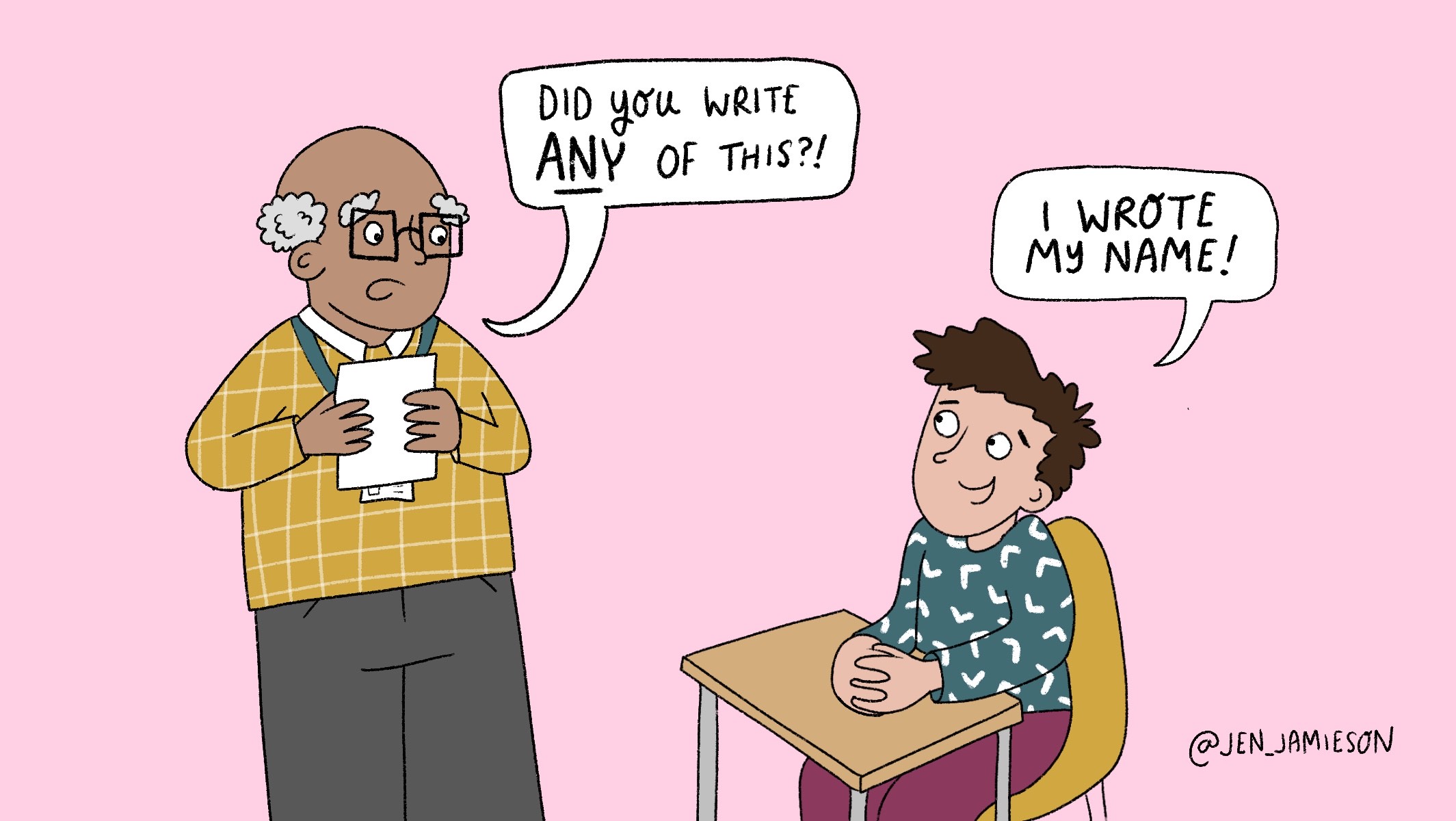
Dear We Are Teachers,
AI tools are everywhere now, and I’m seeing a rise in students submitting work that I know was generated by AI—even for my most simple “get to know you” short answers! I’ve raised the issue with admin, but the response has been vague and noncommittal, e.g., “We’re still figuring out policies.” Meanwhile, it feels like I’m expected to police cheating on my own. I want to be fair, but I also don’t want to let dishonesty slide. What strategies can I use to handle AI cheating, and how do I push for stronger support from my school this year?
—The Robots Are Winning
Dear T.R.A.W.,
First off, I feel you. It’s frustrating to be told “just deal with it” when the technology is literally rewriting the rule book in real time.
I would actually be shocked if you come back this year and your district hasn’t developed an AI policy. AI is a really cool educational tool … but it’s also become a beast for schools in terms of liability. With the Trump administration asking for schools to teach AI literacy, it’s clearly a top issue this year.
Here’s what you can control:
- Have your students write—by hand, in class—a short essay or paragraph the first week of school. You now have a writing sample to compare future assignments to when you receive something that smells fishy. Or robotic, in this case.
- Ask for AI professional development. Sometimes when we’re up against something that feels impossible, it helps to learn as much about it as we can. Training will hopefully help you see benefits you didn’t know about, as well as solutions for its challenges.
- Adjust the way you check for understanding. Catch the process, not just the product. Build in short in-class writing bursts or verbal reflections. If you’ve seen them work through the idea, you know the final product is legit.
- Have “the talk” about AI. Treat it like you would a calculator—there are ways to use it responsibly. Frame it as a skill to learn, not just a sneaky thing to ban.
If somehow you return to school this year and are met with a shrug when it comes to AI and student academic responsibility, write your own policy. You shouldn’t have to be RoboCop for another year.
Dear We Are Teachers,
I’m in a situation I never thought I’d be in when I started teaching here 12 years ago. My husband and I both work at the same school. He teaches English, I teach math … and we’ve decided this summer to get a divorce. It’s amicable (as amicable as these things can be), and neither of us has any intention of leaving our positions. We’ve built our careers, friendships, and routines here. But I’m worried about the awkwardness—not just between us but with our colleagues, admin, and even students who will inevitably bring up my name change. Would it be better for one of us to switch schools? Am I delusional to think it could work to stay colleagues?
—You Get the House, I Get the School
Dear Y.G.T.H.I.G.T.S.,
As you well know, schools are basically their own small towns. People will notice. People will talk. But if you and your ex-to-be are both set on staying in the same school and your split is amicable, I think you can do it.
Here’s how you make it through that first year:
- Get ahead of the grapevine. Loop in your principal and a couple of trusted colleagues so they’re not caught off-guard. Personally, I would want to ask for a minute at the back-to-school faculty meeting to present a short but humorous slide deck with pictures, but not everyone is me (thank goodness).
- Make boundaries together of how to talk about the divorce and each other. I think it’s crucial to agree to not let anyone—other teachers, students, etc.—speak unkindly about the other person or act as if the divorce is something others need to choose sides on. For example, “Brian is a great guy. We are cheering each other on with what’s next.”
- Know your exit signs. If the emotional toll gets heavier than the joy of staying, it’s not a failure to make a change.
Will this be awkward? Absolutely. But with mutual respect and a shared commitment to professionalism and kindness, you might be surprised how quickly it goes from being your number-one worry this year to … just another fact about you.
Dear We Are Teachers,
I’m a first-year teacher, and I feel like I’m on Survivor: High School Edition. I took paper from the “supply closet” (helpfully labeled as such) only to have an intercom announcement demand the supplies be returned to the G Hallway closet. 🙄 Then I got called to the principal’s office for not submitting lesson plans … because no one told me who, when, or how to submit them. There’s no handbook, no onboarding—just a lot of “Oh, you should’ve known that.” Is this normal first-year chaos or a bad sign?—A Rookie Mistake
Dear A.R.M.,
It sounds like a school that doesn’t have a strong onboarding program. But that doesn’t mean it’s a bad sign about the school overall. In fact, maybe it’s a good sign that they don’t have a lot of new employees every year.
Try this:
- Find a buddy teacher and shamelessly ask “dumb” questions. (Spoiler: They’re not dumb. Everyone had to learn this stuff somehow.)
- Start your own cheat sheet of rules, contacts, and quirks of the building. It’ll help you now and save the next newbie later.
- Politely push for clarity. An email to admin saying “I want to make sure I’m following procedures—can you confirm the process for ___?” shows initiative without throwing shade.
And know this: You will continue to have jump scares when it comes to rules, expectations, and procedures you didn’t know about. Part of that is starting a new job, but you’re navigating a school that hasn’t nailed down the best way to support new teachers. That’s on them, not you.
Do you have a burning question? Email us at askweareteachers@weareteachers.com.
Dear We Are Teachers,
I’m reaching out because I’m at my wit’s end trying to engage the parents of my 7th graders who just don’t seem to care. Whether it’s emails, calls, or conferences, I’m often met with excuses or, more often, silence. I know parental involvement matters, but I’m exhausted from putting in so much effort with little-to-no payoff. How do I stop wasting emotional energy chasing parents who won’t show up, without neglecting my responsibility to the kids?
—They’re Just Not That Into Me


